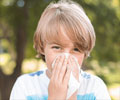
‘Genetic sequencing revealed that children with increased somatic hypermutation (SHM) frequencies in two antibody isotypes (IgD and IgM) demonstrated higher rates of respiratory infections, and children with eczema or allergies showed elevated SHM frequencies in the IgE isotype, central to allergic reactions.’
Tweet it Now
Human B cell populations (producers of the body's protective antibodies) contain a diverse repertoire of B cell receptors (BCRs), which undergo a maturation process known as somatic hypermutation (SHM) during continued exposure to molecules that set off the immune system, or antigens. Researchers suspect that exposure to pathogens and environmental factors can shape how BCRs and antibody variants (or isotypes) develop in infants and young children, in turn influencing the risk of developing allergic conditions. However, the exact relationships between environmental exposure, antibody maturation and allergy remain unclear. Sandra Nielsen and colleagues examined several types of antibodies and BCR composition in young children raised in different household environments. They followed 51 children from birth to three years of age, collecting blood samples from the subjects at one or several yearly time points.
Interestingly, children growing up in households with cleaning products containing the chemicals triclosan and triclocarban had higher SHM frequencies in IgE, IgD and IgG antibodies. Nielsen et al. say that additional studies with larger patient groups should be conducted to confirm their findings and discern other potential influences on B cell development.
Source-Eurekalert










